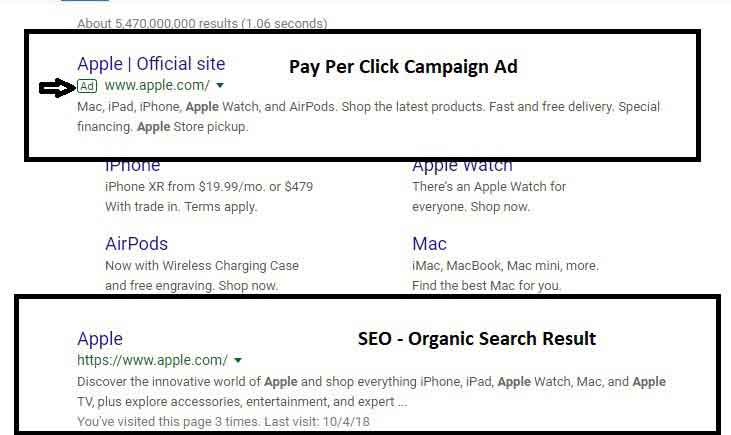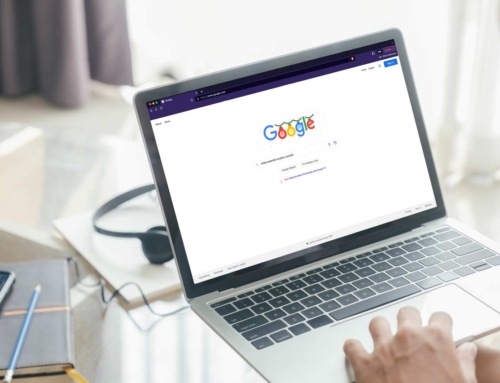Search engine marketing (SEM) is a way of driving qualified traffic to your website by bringing your company to the top on search engine result pages. Advertisers use Pay Per Click (PPC) ads for this method. Search Engine Marketing is a very effective and quick way to get your ROI. We always make relevant ad planning for every business we work with to figure out if SEM is a good fit for their marketing strategy. It is very easy for you to do so. The formula for ad planning is ” (Time * Effort * Advertising Cost) / Outcome = ROI”. If your ROI is more than “1”, SEM is not a good marketing practice for your business or you are doing it wrong. If PPC ads are a waste of money for your business, you can still work on your SEO to get more organic search results. All effective SEM methods also start with good Search Engine Optimization.
Let’s dive into the difference between SEO and PPC more.
To Understand SEM better Let’s Understand SEO and PPC first
What is SEO?
What is PPC?
What is SEO?
What is PPC?
Search Engine Optimization vs Pay Per Click (SEO vs PPC)
In this comparison, We compare search engine optimization and pay-per-click campaigns. Search engine marketing (SEM) is a combination of both. You can see in the “Apple” example, that is a perfect SEM campaign with perfect search engine optimization and pay per click campaign. The ad is always on top of the search engine result pages (SERPs) right before the best organic result. In the example, Apple’s paid ad and organic position are both in the best possible position they could be because Apple has a great digital marketing team and money to invest.

Stability:
With paid ads, your visibility depends on your budget. You will be visible on the search results as your campaign continues. Competition and Cost Per Click (CPC) rates also affect your place. You may also end up at the bottom of the page while waiting to be on the top.
SEO may be a part of SEM but in comparison to Pay Per Click, Search Engine Optimization is a lot different. It is harder to work and may take a long time to get your place in the search engine results pages (SERPs). The outcome of SEO is always more stable because your place is organically given to you. It is not a paid service you are receiving.
Ranking Speed:
SEM practices are not created equally. If it is okay to call PPC placements as ranking, you will get your result in a couple of hours while organic optimization may take a year or more for the final result if you do not make any changes. The organic search result is a long process with many things to be considered.
Cost:
Pay-per-click campaigns are calculated with the cost of the specific keyword you use. Every keyword has a different price and you still have to compete with others by bidding to get the top result. You don’t pay anything until someone clicks your ad, which makes pay-per-click ads way more efficient than outbound marketing methods.
Search Engine Optimization, on the other hand, is free. You don’t have to pay anything to anyone. It is always better to hire professional help though. You can read our article “Why do you need an SEO specialist?”.
Click-Through Rate (CTR):
Most people do not click on the ads because they feel like if somebody is paying to be there, they are trying to sell something. You felt like “so, organic search results are more effective” right? Unfortunately not, an SEM campaign created professionally and supported with good search engine optimization can get a way higher click-through rate. CTR = clicks/impressions. “Professionally done” is the keyword here. Keyword research is the most important part of the pay-per-click campaigns while it is the quality of the content for the organic search results.
Content quality:
The quality of the content is very high in organic search results while it doesn’t have to be for PPC campaigns. The purpose is not to make search engines rich without generating any sales or leads. We always recommend our clients do their SEO first before they start search marketing to not waste their money. Being at the top of the search results does not mean you will generate sales or leads. Bringing visitors in is one thing and converting visitors into customers is another. Plus, every unhappy visitor will increase your bounce rate and decrease your brand value.
First page:
Especially, Google does not promise the first page for any reason or the amount of money. If you increase your ranking organically to the first page that is a different story. As long as, you keep your hard work on the right path, you will stay there. Google is not going to kick you out to the other pages just because you are not paying.
ROI (return on investment) in SEM
Search engine marketing is all about getting the most from the SERPs (Search Engine Result Pages) as a result of the pay-per-click campaign and search engine optimization. Most of the time small businesses are finding someone familiar with these terms and trust them to save a few bucks. That is a big “NO”. Search engine marketing may end up with a very high cost and low ROI. By saying high cost, we meant; losing hope, losing money, and losing time…
Search engine optimization has a very complex logic and pay-per-click campaigns require very detailed keyword research and settings. We always recommend you work with a digital marketing specialist for your campaigns. Your landing page, optimization of your site, the loading speed of your site, image quality, and many more factor may affect your result. Your campaign may finish very successfully or may be a disaster. It is all about how you have done it and if you were ready to do it.

Reasons for failed SEM Campaigns:
There are always differences between the things done professionally and unprofessionally. Unprofessional people may make some of the following mistakes which are basic routines for a professional. Let’s make a small list of the most common mistakes done by people when setting up a search engine marketing campaign.
non-SEO-friendly landing pages
- If you talk to a professional, they will tell you not to start a pay-per-click campaign until your landing page, if not the whole site, is search engine optimized.
Slow Website Loading Speed
- 40-60% of people visiting websites leave the site if the page is not fully loaded in 3 seconds. Can you imagine the cost of this? You couldn’t even show your product to them before they leave but now you got charged because they clicked the link. Make sure you had at least your landing page speed optimization before you start any campaign.
Setting up the wrong budget
- No one can know your budget better than you. Make sure your SEM professional is giving you the advice but not convincing you to spend more than you wish. A real professional does not try to make one time hit. They will help you to build hope around online marketing.
Wrong keyword
- You spent money, time, and effort but the return on investment is “0”. You got too many impressions but very few clicks. Your click-through rate is less than “1” and you couldn’t sell anything. Then you should start thinking that your targeted audience is not right. More than anything, the wrong keyword makes you lose a lot of time.
Competitive keywords
- Long-tail keywords are multiple-word keywords also known as key phrases. The results you are getting from this type of keyword will be more effective. Let’s say you are looking for a used car in NY. Would you just search for “car” or “used car in NY”? You need to be specific to generate more sales/leads by reaching real potential customers. Just using “car” or “used car” as your keyword may increase your impression but not your ROI.
Freelancers or Digital Marketing Agencies
If you work with a digital marketing agency, you will probably end up paying more than you pay for a freelancer. It is because of their business costs. On the other hand, agencies are less riskier, especially if they are local. We are all in a virtual world. This means you can hire anyone around the globe to run your campaigns but keep this in mind, local businesses are small enough to care and large enough to act professionally. We always recommend you make sure about the knowledge of the person you will work with. If you don’t know what to ask, YouTube is a great source. Get the questions from YouTube and ask, you don’t have to know the right answers. They don’t know that.





